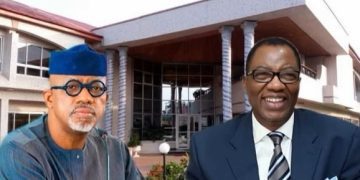Afua’s story is one of dual identity. A British-Nigerian of mixed heritage, she moves effortlessly between the expectations of Western society and the heritage of her ancestors
By Dayo DaSilva
In a vibrant swirl of gele, lace and rhythmic drumbeats, she takes her place, microphone in hand, voice steady, presence commanding. She is not a singer, not a celebrity in the traditional sense, but when Afua Tijani, known to many as Sisialayeye, steps onto the wedding floor, all eyes are on her.
More than an emcee, Afua is a storyteller, a cultural custodian and a bridge between continents. Based in the United Kingdom, she is one of the most sought-after alaga, traditional Yoruba ceremonial host in the diaspora, blending deep-rooted Nigerian customs with the sophistication of life abroad.
“I don’t just anchor weddings,” she says. “I uphold legacy. Every song, every chant, every instruction has meaning. I’m here to remind people of that and to make it unforgettable.”

For the uninitiated, an alaga is the ceremonial pulse of a Yoruba wedding. Traditionally, two women lead the ceremony, the alaga ijoko, who acts on behalf of the bride’s family and often teases or heckles the groom’s family for fun and the alaga iduro, who respectfully negotiates the union. It is dramatic, it is humorous, it is ceremonial theatre. And Sisialayeye plays both roles with flair, heart and cultural insight.
Over the past five years, she has performed at hundreds of weddings, flying between cities and countries to lead ceremonies that weave tradition with contemporary taste. During busy months, she may host up to 30 events. Her preparation is intense, not only learning the structure of the event, but researching the cultural origins of the couple’s families to include songs and chants from their home states. “It matters,” she says. “It tells the guests, ‘This day is yours and your roots matter.’
Who would have imagined that Afua, the young girl from Olomore in Ogun State with Ghanaian-Nigerian roots, would grow to become one of the most respected and celebrated alaga in the diaspora? Despite her mixed heritage, today she speaks Yoruba with confidence and fluency, earning admiration for her cultural command. Her transformation from those humble beginnings to a cultural icon is a testament to passion, perseverance and a deep sense of identity. It is this fusion of heritage and heart that continues to set her apart on every stage she graces.
It is this passion and professionalism that have earned her recognition far beyond the wedding floor.
In 2021, she appeared in Highlife, Channel 4’s glossy reality series spotlighting the UK’s elite young Black professionals. She has also featured in Vogue UK, not for her style alone, but for her cultural significance proving that tradition can be as powerful as trend.
Afua’s story is one of dual identity. A British-Nigerian of mixed heritage, she moves effortlessly between the expectations of Western society and the heritage of her ancestors. Rather than choose between both, she embraces them. “You can be modern and still be deeply traditional,” she insists. “It’s not either, or. It’s both, with pride.”
Her ceremonies now often include DJs spinning Afrobeats hits from Burna Boy and Davido alongside talking drums, and she notes a shift in some of the symbolism. “The bride price tradition is evolving,” she explains. “More families now say, ‘We’re not selling our daughter.’ They accept the gifts but return them, emphasizing love and mutual respect.”
But make no mistake, beneath the glittering fabric and party vibes lies a serious mission. Afua is fighting against cultural erosion in a world that often forgets its past in pursuit of progress. “If we lose these traditions,” she says, “we lose who we are. My job is to make sure we don’t.”
The job comes with perks, including once being sprayed with over a million naira at a single event, but for Afua, the real reward is seeing guests light up with pride, laughter and nostalgia. “Especially abroad, our weddings become more than celebrations. They become classrooms, museums, performances living, breathing culture.”

As someone who has watched her journey from humble beginnings to the heights of cultural recognition, yours truly pens this piece in celebration of Afua Tijani’s greatness and remarkable achievements. Her work is more than a performance, it is a ministry of joy, unity and heritage. Through every ceremony she anchors, Sisialayeye continues to be a blessing, not just to the couples she joins in love, but to the families whose stories she helps honour and the culture she so beautifully preserves.
In choosing Afua Tijani, clients don’t just hire an alaga. They invest in history, artistry and a powerful message: that Nigerian traditions, especially Yoruba ones, are not only relevant but radiant on the world stage.
It brings me immense pride to witness Afua Tijani, Sisialayeye, blossom into a beacon of culture, pride and purpose. Her story is one that inspires, uplifts and reminds us all of the power in embracing who we are. As she continues to bless homes with her voice and presence, may her light never dim and may her roots always anchor her greatness. This tribute comes not just from a writer’s pen, but from a heart that truly celebrates her.

:And so, amid cheers and songs, as family members toss naira notes into the air and elders nod with approval, Sisialayeye continues her mission, one wedding at a time, one tradition preserved, one culture revived in full color.
•Dayo DaSilva (arpa, amncs) is a Media Professional and Publisher
Email: dsv123ng@yahoo.com








































